By Leen Randell
Updated: Jul 04, 2024
10 Best Herbal Decoctions For Swollen Gums

Herbal decoctions for swollen gums are natural remedies made by steeping herbs in hot water to create a concentrated liquid solution that can be used to soothe and calm inflamed and irritated gum tissue.
These decoctions help to reduce swelling, alleviate pain, and combat bacterial infections that cause gum disease. Examples of herbal decoctions that provide relief include chamomile tea, which reduces inflammation and promotes healing, and clove oil, which has antibacterial properties that eliminate harmful bacteria.
By using these natural remedies, individuals can improve their oral health, reducing discomfort and improving overall well-being.
The following article describes in detail the most important decoctions for swollen gums, including medicinal properties, parts of herbs to use, and recipes for preparations.
- 1. Calendula officinalis
- 2. Salvia miltiorrhiza
- 3. Glycyrrhiza glabra
- 4. Echinacea angustifolia
- 5. Taraxacum officinale
- 6. Hydrastis canadensis
- 7. Myrrhis odorata
- 8. Sambucus nigra
- 9. Equisetum arvense
- 10. Matricaria chamomilla
- What is the best combination of herbal decoctions to use for swollen gums?
- What ailments similar to swollen gums are treated with herbal decoctions?
1. Calendula officinalis
Pot marigold decoctions helps with swollen gums because of its potent anti-inflammatory properties.
The decoction's flavonoids and terpenes work together to reduce inflammation and alleviate pain in the gums, making it an effective natural remedy for treating gingivitis and periodontal disease.
Additionally, pot marigold's antimicrobial properties help combat bacteria that can cause gum infections, promoting healthy gums and a reduction in swelling.
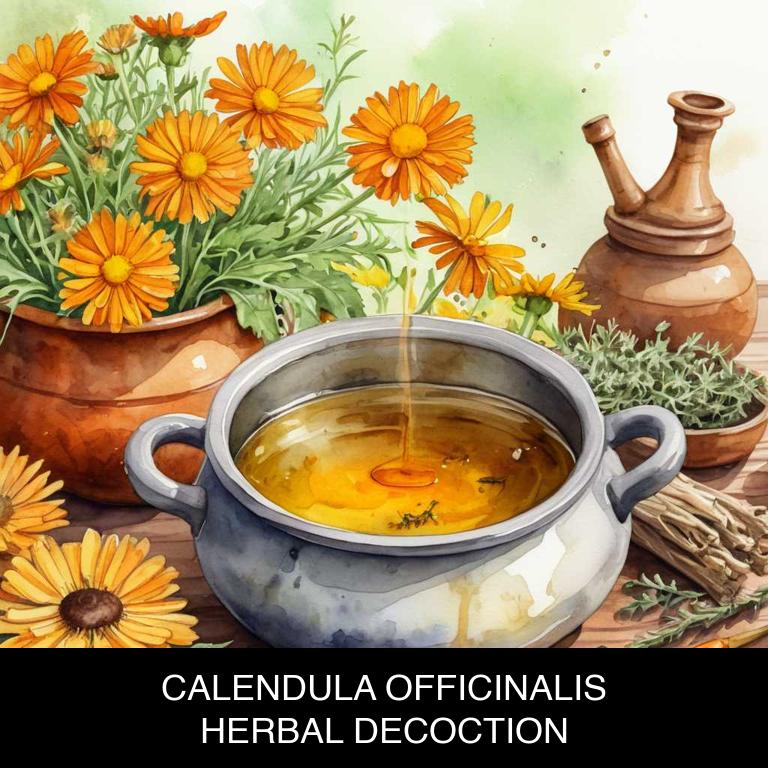
Medicinal Constituents
The list below shows the primary medicinal constituents in Calendula officinalis decoctions that help with swollen gums.
- Carotenoids: These antioxidants help reduce inflammation and promote wound healing in swollen gums by neutralizing free radicals and protecting tissues from damage.
- Flavonoids: These polyphenolic compounds exhibit anti-inflammatory and antimicrobial properties, which help alleviate swollen gums by reducing bacterial growth and inflammation in the affected area.
- Triterpenoids: These compounds possess anti-inflammatory and immunomodulatory effects, which contribute to the reduction of swollen gums by modulating the immune response and reducing inflammation in the oral cavity.
Parts Used
The list below shows the primary parts of pot marigold used to make decoctions for swollen gums.
- Flowers: They are used for their anti-inflammatory and antimicrobial properties to reduce swelling and combat infection.
- Leaves: They are used for their anti-inflammatory and antiseptic properties to soothe and protect the affected area.
- Roots: They are used for their antiseptic and anti-inflammatory properties to promote healing and reduce swelling.
Quick Recipe
The following recipe gives a procedure to make a basic pot marigold for swollen gums.
- Harvest calendula officinalis flowers during the peak bloom season when they are in full color.
- Dry the freshly harvested flowers in a single layer on paper bags for 2 weeks.
- Combine 1 tablespoon of dried calendula officinalis flowers with 1 quart of boiling water.
- Steep the mixture for 10 to 15 minutes to allow the flowers to infuse their properties.
- Strain the decoction and discard the solids to produce a ready-to-use liquid extract.
2. Salvia miltiorrhiza
Danshen decoctions helps with swollen gums because it contains salivan, a natural anti-inflammatory compound that effectively reduces swelling and pain.
The decoction's bioactive compounds also exhibit antimicrobial properties, which help to combat the underlying infection causing the gum inflammation. Additionally, danshen decoctions contain antioxidants that promote healing by reducing oxidative stress and promoting collagen synthesis, thereby facilitating the repair of damaged tissues in the gums.
By addressing the root causes of swollen gums, danshen decoctions provide natural relief from discomfort and promote overall oral health.
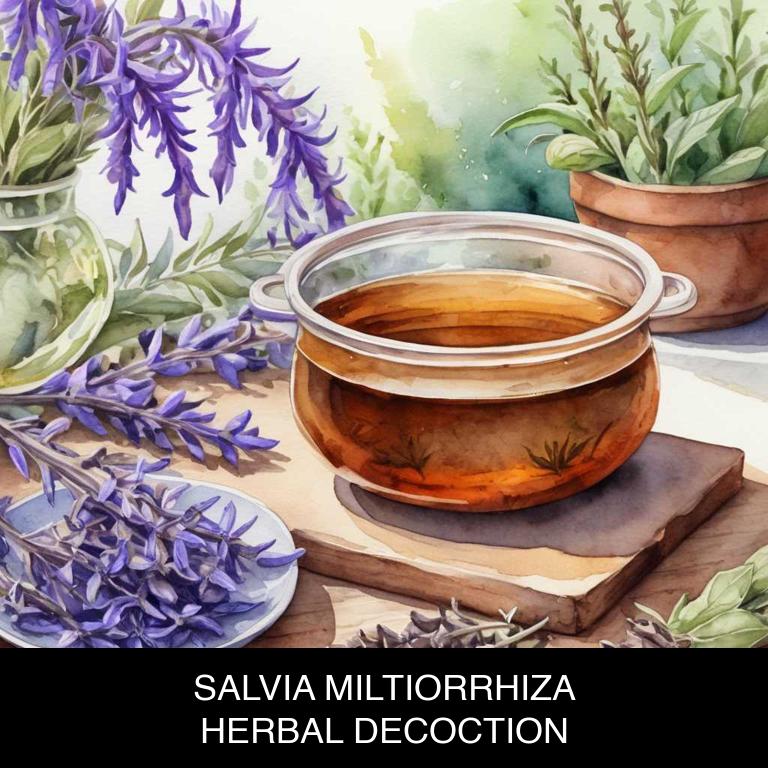
Medicinal Constituents
The list below shows the primary medicinal constituents in Salvia miltiorrhiza decoctions that help with swollen gums.
- Tanshinone: Tanshinone has anti-inflammatory properties that help reduce swelling and alleviate pain in swollen gums by inhibiting the production of pro-inflammatory cytokines.
- Salvianolic acid a: Salvianolic acid A exhibits strong antioxidant and anti-inflammatory activities that help protect the gums from oxidative damage and reduce inflammation, thus alleviating swollen gums.
- Carnosic acid: Carnosic acid has been shown to possess anti-inflammatory and antimicrobial properties that help reduce bacterial load and inflammation in swollen gums, promoting healing and recovery.
Parts Used
The list below shows the primary parts of danshen used to make decoctions for swollen gums.
- Roots: They are used due to their high concentration of compounds like tanshinone, which has anti-inflammatory properties that help reduce swelling in the gums.
- Rhyzomes: They are used because they contain similar compounds to the roots, which help to reduce inflammation and soothe swollen gums.
- Barks: They are used due to their rich content of tanshinone and other bioactive compounds that help to alleviate pain and inflammation associated with swollen gums.
Quick Recipe
The following recipe gives a procedure to make a basic danshen for swollen gums.
- Weigh 9-15 grams of dried salvia miltiorrhiza root and rinse it with cold water to remove impurities.
- Crush the dried root into a fine powder using a mortar and pestle to increase surface area.
- Combine the powdered root with 1 liter of boiling water in a heat-resistant glass or ceramic container.
- Allow the mixture to steep for 30-60 minutes to extract the active compounds from the root.
- Strain the decoction through a cheesecloth or fine-mesh sieve into a clean container and discard the solids.
3. Glycyrrhiza glabra
Licorice decoctions helps with swollen gums because of its anti-inflammatory properties, which reduce swelling and discomfort.
The flavonoids present in licorice root have been shown to inhibit the production of pro-inflammatory enzymes, thereby alleviating inflammation in the gums. Additionally, licorice decoctions contain glycyrrhizin, a compound that has been found to stimulate the production of white blood cells, which helps to combat infections and promote healing.
This natural remedy can provide relief from swollen gums, promoting oral health and comfort.

Medicinal Constituents
The list below shows the primary medicinal constituents in Glycyrrhiza glabra decoctions that help with swollen gums.
- Glycyrrhizin: This triterpenoid saponin helps reduce inflammation and swelling in the gums by inhibiting the production of pro-inflammatory enzymes and cytokines.
- Liquiritigenin: This isoflavonoid has anti-inflammatory and antibacterial properties, which help combat gum inflammation and infection, leading to reduced swelling.
- Licoricidin: This flavonoid glycoside exhibits anti-inflammatory and antioxidant properties, which aid in soothing gum inflammation, reducing swelling, and promoting healing.
Parts Used
The list below shows the primary parts of licorice used to make decoctions for swollen gums.
- Roots: Glycyrrhiza glabra roots contain glycyrrhizin, a compound that has anti-inflammatory and anti-bacterial properties, which can help soothe swollen gums.
- Leaves: Glycyrrhiza glabra leaves are used to make decoctions that can help reduce inflammation and alleviate pain associated with swollen gums.
Quick Recipe
The following recipe gives a procedure to make a basic licorice for swollen gums.
- Harvest 10-20 grams of dried glycyrrhiza glabra roots for decoction preparation in a clean environment.
- Chop the harvested roots into smaller pieces to increase their surface area for better extraction.
- Combine the chopped roots with 1 liter of cold water in a saucepan and bring to a boil.
- Reduce heat to low and simmer the mixture for 30-40 minutes or until the liquid has reduced.
- Strain the decoction through a cheesecloth or a fine-mesh sieve to remove the roots and discard the solids.
4. Echinacea angustifolia
Kansas coneflower decoctions helps with swollen gums because they contain a unique combination of bioactive compounds that have potent anti-inflammatory properties.
The decoction's active ingredients, such as echinacein and chlorogenic acid, work together to reduce inflammation and alleviate discomfort in the affected area. This natural remedy effectively soothes and calms swollen gums, providing relief from pain and discomfort associated with gum infections and inflammation.
By reducing swelling and inflammation, Kansas coneflower decoctions promote healthy gum tissue and overall oral wellness.
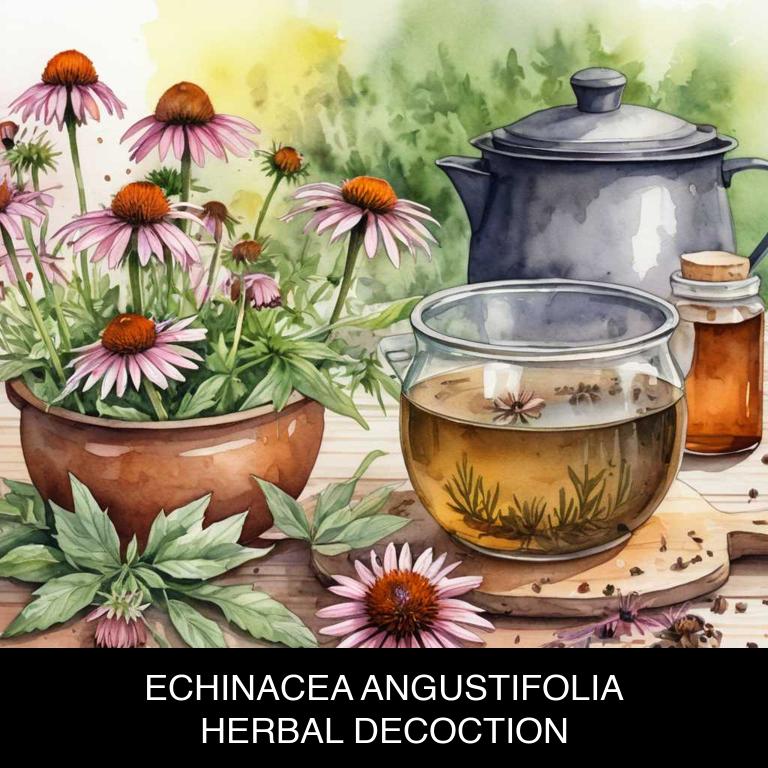
Medicinal Constituents
The list below shows the primary medicinal constituents in Echinacea angustifolia decoctions that help with swollen gums.
- Iridoid glycosides: These compounds have anti-inflammatory properties, which can help to reduce swelling and alleviate pain associated with swollen gums.
- Alkaloids: These compounds have been shown to have anti-inflammatory and antimicrobial properties, which can help to combat bacterial infections and reduce inflammation in swollen gums.
- Phenolic acids: These compounds have antioxidant and anti-inflammatory properties, which can help to protect the gums from oxidative stress and reduce inflammation, thereby alleviating swollen gums.
Parts Used
The list below shows the primary parts of kansas coneflower used to make decoctions for swollen gums.
- Roots: They contain a high concentration of active compounds, making them the primary source for Echinacea angustifolia decoctions.
- Leaves: They possess some of the plant's medicinal properties, but their potency is generally lower compared to roots.
- Stems: They also contain some medicinal properties, but like leaves, their effectiveness is not as pronounced as the roots.
Quick Recipe
The following recipe gives a procedure to make a basic kansas coneflower for swollen gums.
- Harvest fresh echinacea angustifolia roots in the fall after the first frost when the plant is dormant weighing about 2-3 pounds.
- Dry the echinacea angustifolia roots in a warm place with good air circulation for 1-2 weeks.
- Chop the dried echinacea angustifolia roots into small pieces using a sharp knife or a mortar and pestle.
- Combine 1 teaspoon of the chopped echinacea angustifolia root with 1 quart of boiling water and let it steep for 10-15 minutes.
- Strain the decoction through a cheesecloth or a coffee filter into a clean container discarding the solids and store in the refrigerator.
5. Taraxacum officinale
Dandelion decoctions helps with swollen gums because of its anti-inflammatory and antimicrobial properties.
The antioxidants present in dandelion help reduce swelling and alleviate pain associated with gum inflammation. Additionally, dandelion's ability to stimulate saliva production can wash away bacteria and food particles that can contribute to gum irritation.
By reducing inflammation and promoting a healthy mouth environment, dandelion decoctions can provide relief from swollen gums, promoting overall oral health and well-being.

Medicinal Constituents
The list below shows the primary medicinal constituents in Taraxacum officinale decoctions that help with swollen gums.
- Luteolin: As a flavonoid antioxidant, luteolin has anti-inflammatory properties that may help reduce swelling in gums by inhibiting the production of pro-inflammatory enzymes.
- Taraxasterol: This triterpenoid saponin has anti-inflammatory and antimicrobial properties, which can help alleviate gum inflammation and reduce the risk of infection that may exacerbate swollen gums.
- Caffeic acid: As a polyphenolic acid, caffeic acid has potent antioxidant and anti-inflammatory activities that can help mitigate gum inflammation and promote healing by reducing oxidative stress and suppressing pro-inflammatory pathways.
Parts Used
The list below shows the primary parts of dandelion used to make decoctions for swollen gums.
- Leaves: Used for their anti-inflammatory and antimicrobial properties to soothe and reduce swelling.
- Roots: Employed for their bitter compounds, which are believed to have anti-inflammatory and antiseptic effects to combat gum inflammation.
- Flowers: Utilized for their flavonoids and other compounds that may help reduce swelling and infection in the gums.
Quick Recipe
The following recipe gives a procedure to make a basic dandelion for swollen gums.
- Harvest a handful of fresh taraxacum officinale roots and clean them thoroughly with cold running water.
- Chop the cleaned roots into small pieces weighing about 20 grams for every 250 milliliters of water.
- Combine the chopped roots with 250 milliliters of boiling water in a heat-resistant glass container.
- Reduce heat to a low simmer and allow the mixture to steep for 15 to 30 minutes.
- Strain the liquid mixture through a cheesecloth or a fine-mesh sieve into a clean container to discard solids.
6. Hydrastis canadensis
Goldenseal decoctions helps with swollen gums because it contains berberine, a natural compound that has potent anti-inflammatory properties.
When consumed as a decoction, goldenseal's berberine works to reduce swelling and alleviate discomfort in the gums by inhibiting the production of prostaglandins, which are chemicals that cause inflammation. Additionally, goldenseal's antimicrobial properties help to combat bacterial infections that can contribute to gum inflammation.
As a result, goldenseal decoctions can provide effective relief from swollen gums and promote overall oral health.
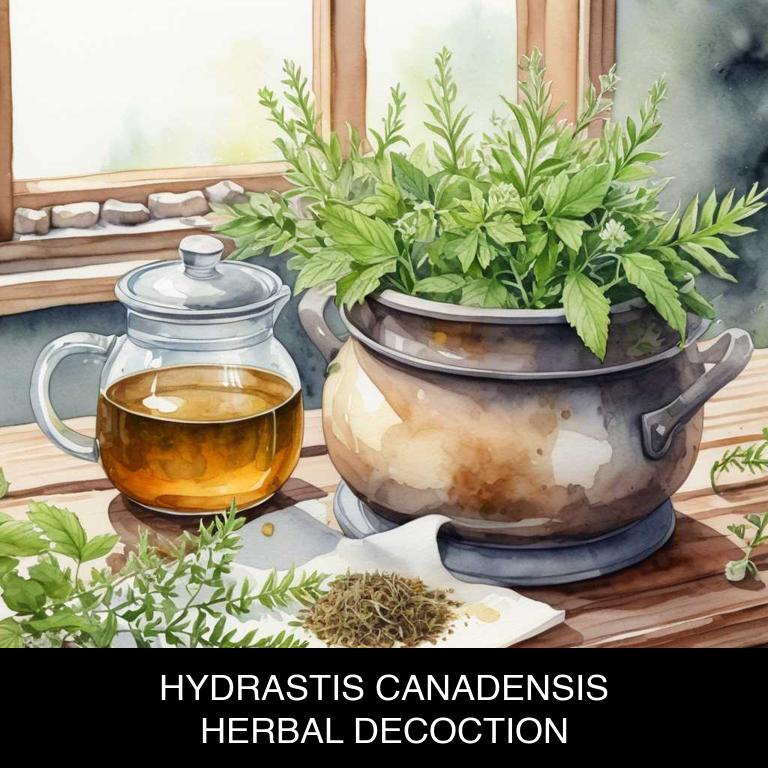
Medicinal Constituents
The list below shows the primary medicinal constituents in Hydrastis canadensis decoctions that help with swollen gums.
- Berberine: A bioactive alkaloid that has anti-inflammatory properties, which can help reduce swelling and inflammation in the gums.
- Vasaka alkaloids: These alkaloids have antimicrobial properties, which can help combat the underlying infection or inflammation causing swollen gums.
- Polysaccharides and phenolic acids: These compounds have anti-inflammatory and antioxidant properties, which can help soothe and calm the inflamed gums, promoting healing and reducing pain.
Parts Used
The list below shows the primary parts of goldenseal used to make decoctions for swollen gums.
- Roots: The roots are the primary part used due to their high concentration of bioactive compounds, particularly berberine, which has anti-inflammatory and antimicrobial properties.
- Barks: The barks are also used to make decoctions for swollen gums, as they contain berberine and other compounds that help reduce inflammation and promote healing.
- Leaves: The leaves are used in some decoctions, although to a lesser extent than the roots and barks, as they still contain berberine and other compounds that contribute to their anti-inflammatory effects.
Quick Recipe
The following recipe gives a procedure to make a basic goldenseal for swollen gums.
- Measure out 2 to 4 grams of dried hydrastis canadensis root in a clean glass container.
- Combine the measured root with 100 milliliters of boiling water in a heat-resistant glass or ceramic cup.
- Reduce heat to a simmer and allow the mixture to steep for 5 to 10 minutes.
- Strain the decoction through a cheesecloth or a fine-mesh sieve into a clean glass container.
- Discard the solids and store the decoction in the refrigerator for up to 24 hours.
7. Myrrhis odorata
Sweet cicely decoctions helps with swollen gums because of its potent anti-inflammatory properties.
The decoction's active compounds, such as polyphenols and flavonoids, work to reduce swelling and alleviate discomfort in the mouth. Additionally, sweet cicely has natural antibacterial properties that help combat the underlying infections causing gum inflammation.
By reducing inflammation and combating bacteria, sweet cicely decoctions provide a natural remedy for soothing swollen gums, promoting a healthy and comfortable oral environment.
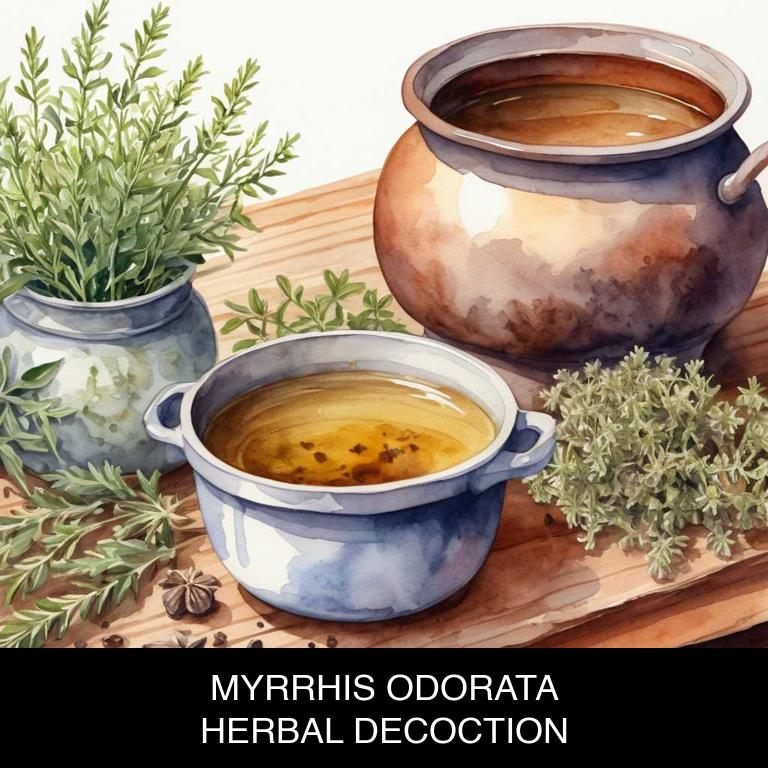
Medicinal Constituents
The list below shows the primary medicinal constituents in Myrrhis odorata decoctions that help with swollen gums.
- Phenolic acids: They help with swollen gums by exhibiting anti-inflammatory properties, reducing swelling and pain associated with gum inflammation.
- Coumarins: They help with swollen gums by showing antimicrobial activity, preventing the growth of bacteria that cause gum infections and inflammation.
- Flavonoids: They help with swollen gums by possessing antioxidant properties, reducing oxidative stress and inflammation in the gums.
Parts Used
The list below shows the primary parts of sweet cicely used to make decoctions for swollen gums.
- Roots::
- Leaves::
- Buds::
Quick Recipe
The following recipe gives a procedure to make a basic sweet cicely for swollen gums.
- Harvest fresh myrrhis odorata leaves and stems in the early morning to ensure optimal potency retention.
- Clean and chop 30g of the harvested plant material into smaller pieces to increase surface area exposure.
- Combine the chopped plant material with 1l of boiling water to create a decoction base.
- Steep the plant mixture for 10-15 minutes to allow the bioactive compounds to infuse into the water.
- Strain the decoction through a cheesecloth or fine-mesh sieve to remove the solids and discard the plant material.
8. Sambucus nigra
Elder decoctions helps with swollen gums because of its anti-inflammatory properties, which effectively reduce swelling and ease pain.
The antioxidants present in elderberries help to neutralize free radicals that can cause inflammation, while the bioactive compounds like flavonoids and phenolic acids inhibit the production of pro-inflammatory enzymes. This natural remedy also exhibits antibacterial properties, helping to combat underlying infections that may be contributing to swollen gums.
Regular consumption of elder decoctions can provide relief from gum inflammation and promote overall oral health.
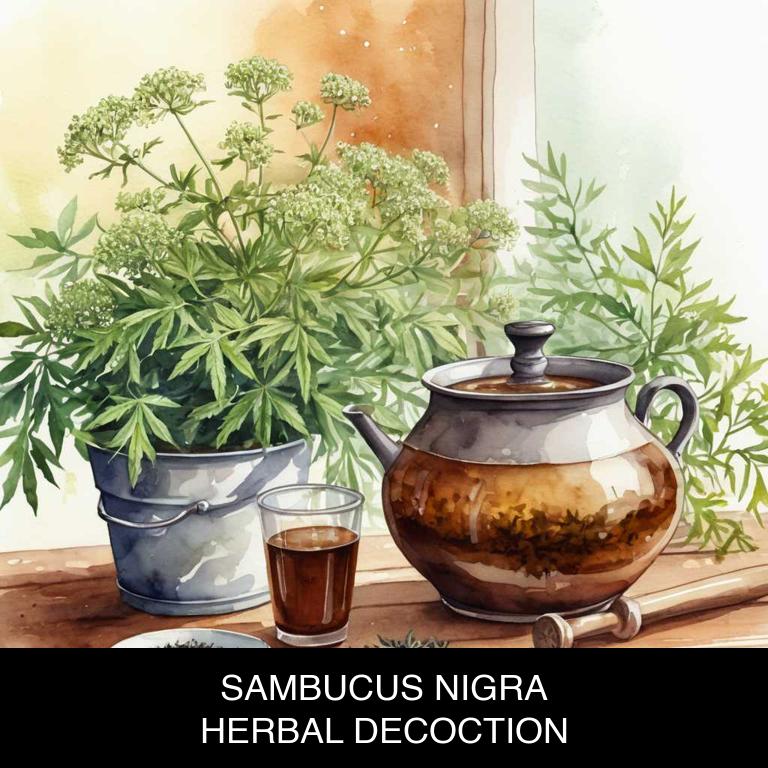
Medicinal Constituents
The list below shows the primary medicinal constituents in Sambucus nigra decoctions that help with swollen gums.
- Phenolics: These compounds have anti-inflammatory properties, which help reduce swelling and ease pain in swollen gums.
- Anthocyanins: As powerful antioxidants, anthocyanins help reduce inflammation and prevent the progression of gum disease, which can cause swollen gums.
- Saponins: These compounds have antimicrobial properties, which help prevent the growth of bacteria that can cause gum infections and lead to swollen gums.
Parts Used
The list below shows the primary parts of elder used to make decoctions for swollen gums.
- Flowers: They are the most commonly used part due to their high content of antiseptic and anti-inflammatory compounds that help alleviate swollen gums.
- Leaves: They contain bioflavonoids that aid in reducing inflammation and promoting healing in swollen gums.
- Buds: The buds are rich in flavonoids and anthocyanins, which help to combat infection and reduce swelling in the gums.
Quick Recipe
The following recipe gives a procedure to make a basic elder for swollen gums.
- Harvest sambucus nigra flowers and leaves in late summer or early autumn when they are in full bloom.
- Gently clean the harvested plant material with cold water to remove any dirt or debris immediately.
- Combine 2-4 tablespoons of the cleaned plant material with 1 quart of boiling water to create a decoction.
- Reduce heat and simmer the decoction for 10-15 minutes to release the active compounds slowly.
- Strain the decoction through a cheesecloth or a fine-mesh sieve into a clean container to remove solids completely.
9. Equisetum arvense
Field horsetail decoctions helps with swollen gums because of its rich content of silica, a mineral that has anti-inflammatory properties.
The decoction absorbs into the gum tissue, reducing inflammation and swelling by neutralizing acidic compounds and promoting healthy collagen production.
Additionally, field horsetail's antioxidant properties help combat free radicals that can exacerbate gum inflammation, leading to a reduction in redness, pain, and discomfort associated with swollen gums.
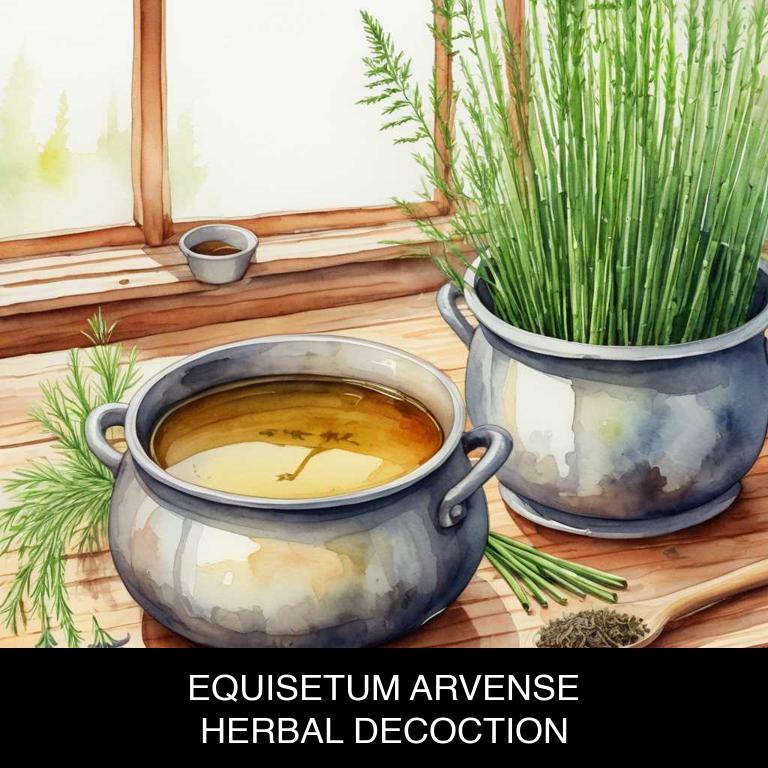
Medicinal Constituents
The list below shows the primary medicinal constituents in Equisetum arvense decoctions that help with swollen gums.
- Sesquiterpene lactones: These compounds have anti-inflammatory properties, which help reduce swelling and alleviate pain associated with swollen gums.
- Flavonoids: As potent antioxidants and anti-inflammatory agents, flavonoids in Equisetum arvense decoctions can help combat gum inflammation and promote healing.
- Coumarins: These compounds possess anti-inflammatory and antiseptic properties, which help reduce gum inflammation, prevent infection, and promote a healthy gum environment.
Parts Used
The list below shows the primary parts of field horsetail used to make decoctions for swollen gums.
- Roots: Used to make decoctions for swollen gums due to their anti-inflammatory properties.
- Rhyzomes: Used to make decoctions for swollen gums as they contain compounds that help reduce inflammation.
- Stems: Used to make decoctions for swollen gums due to their ability to reduce swelling and inflammation.
Quick Recipe
The following recipe gives a procedure to make a basic field horsetail for swollen gums.
- Gather 2 ounces of dried equisetum arvense rhizomes and roots for the decoction.
- Combine the equisetum arvense with 2 quarts of cold water in a large pot.
- Bring the water to a boil over high heat for 10 minutes then reduce heat.
- Simmer the mixture for 30 minutes or 1 hour for a stronger decoction.
- Strain the liquid through a cheesecloth or fine-mesh sieve into a bowl or container.
10. Matricaria chamomilla
Chamomile decoctions helps with swollen gums because of its anti-inflammatory properties.
The apigenin and bisabolol present in chamomile work synergistically to reduce swelling, pain, and inflammation caused by gum disease or irritation from dental procedures. As a natural antiseptic, chamomile decoctions also help eliminate bacteria that can contribute to gum inflammation.
Additionally, chamomile's soothing effects calm the gums, providing relief from discomfort and promoting healing.
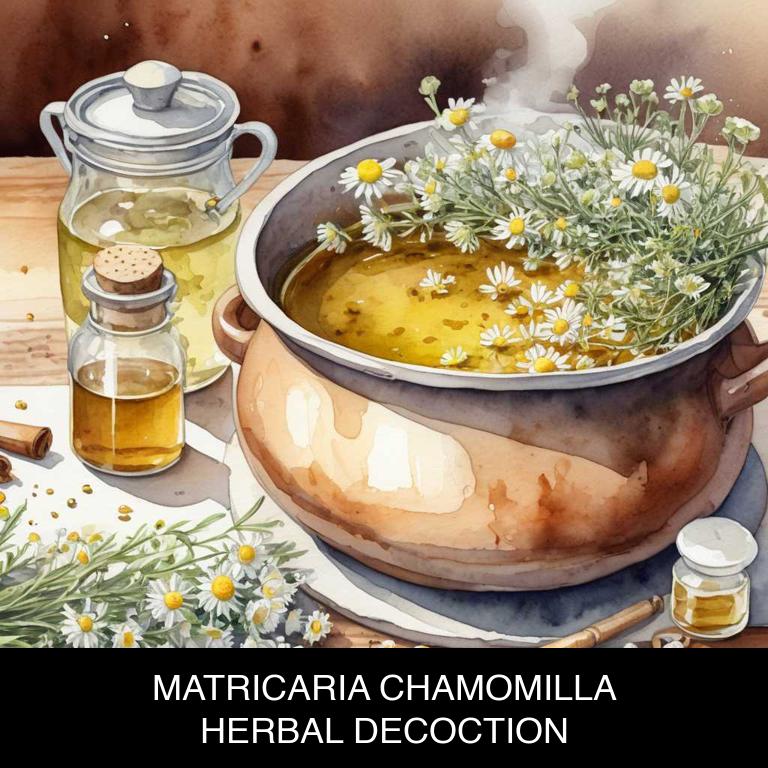
Medicinal Constituents
The list below shows the primary medicinal constituents in Matricaria chamomilla decoctions that help with swollen gums.
- Apigenin: This flavonoid helps reduce inflammation and soothe swollen gums by inhibiting the production of pro-inflammatory enzymes.
- Luteolin: This flavonoid has anti-inflammatory and antimicrobial properties, which help combat gum infections and reduce swelling by suppressing the growth of bacteria and other pathogens.
- Α-bisabolol: This sesquiterpene has anti-inflammatory and antioxidant properties, which help alleviate swollen gums by reducing inflammation, promoting wound healing, and preventing further tissue damage.
Parts Used
The list below shows the primary parts of chamomile used to make decoctions for swollen gums.
- Flowers: Used for decoctions due to their anti-inflammatory and soothing properties.
- Seeds: Employed for their antimicrobial action to aid in reducing gum inflammation and infection.
- (optional) leaves: Sometimes used for their mild anti-inflammatory properties, but less frequently than flowers and seeds.
Quick Recipe
The following recipe gives a procedure to make a basic chamomile for swollen gums.
- Measure 2-3 teaspoons of dried matricaria chamomilla flowers and add to a heat-resistant glass container.
- Combine the dried flowers with 1 cup of boiling water and let it steep for 5-7 minutes.
- Strain the mixture through a fine-mesh sieve into a separate container to remove the solids.
- Discard the solids and use the resulting liquid as a decoction for topical or internal use.
- Store the decoction in the refrigerator for up to 3 days or freeze for later use.
What is the best combination of herbal decoctions to use for swollen gums?
The best combination of herbal decoctions that help with swollen gums is a blend of calendula, echinacea, and peppermint.
Calendula's anti-inflammatory properties reduce swelling and promote healing, while echinacea's immune-boosting properties help fight off underlying infections. Peppermint's antiseptic and antibacterial properties combat bacteria and ease pain.
To make this decoction, steep 1 teaspoon of dried calendula, 1 teaspoon of dried echinacea, and 1 teaspoon of dried peppermint leaves in 8 ounces of boiling water for 5-7 minutes, then strain and drink 2-3 times a day to alleviate swollen gums.
What ailments similar to swollen gums are treated with herbal decoctions?
Ailments similar to swollen gums that are treated with herbal decoctions are various oral health issues, such as periodontitis, pyorrhea, and thrush.
Decoctions of herbs like neem, turmeric, and clove have anti-inflammatory properties that help reduce swelling and alleviate pain in the affected areas. Additionally, decoctions made from ingredients like sage, chamomile, and peppermint can soothe gum inflammation and freshen breath.
These herbal remedies can provide effective relief without harsh chemicals or antibiotics.